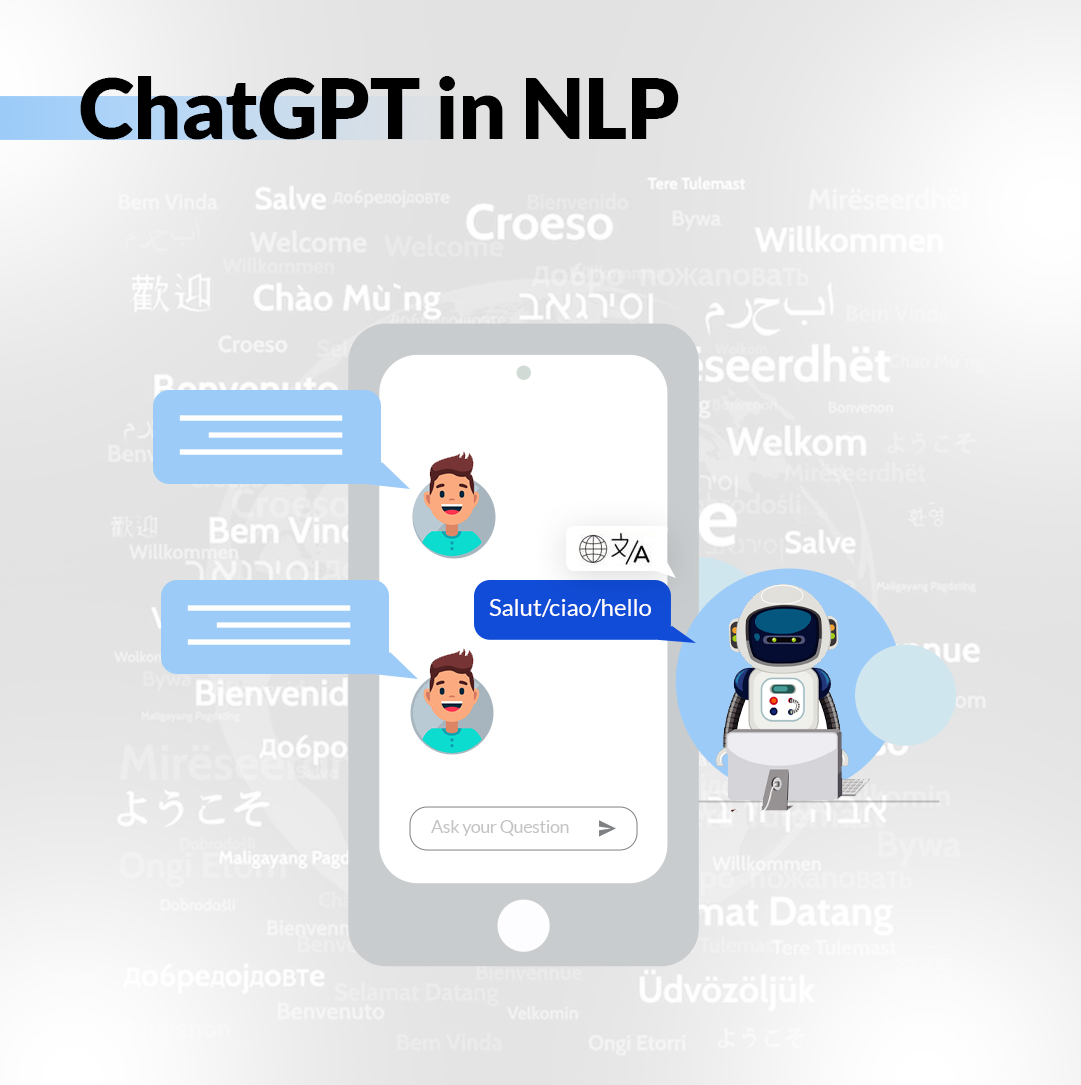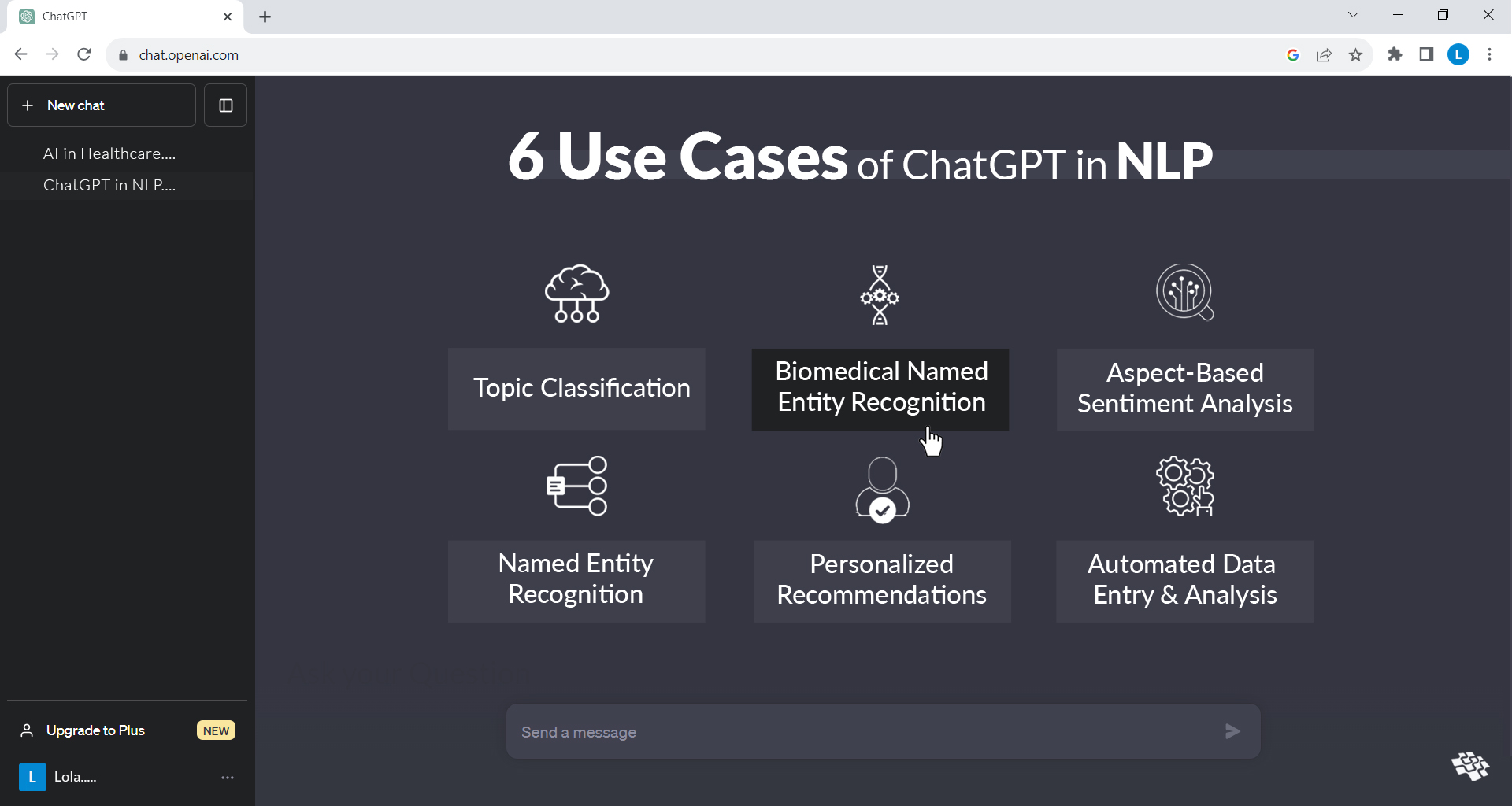ChatGPT’s Use Cases in Natural Language Processing for Your Business

“The natural language processing market was valued at $27.73 billion in 2022 and is expected to grow at a CAGR of 40.4% from 2022 to 2030. The surge in large language models entering the commercial space has significantly contributed to this expansion.”- Grand view research
Overview of Natural Language Processing (NLP)
As a business owner, you understand the paramount importance of providing exceptional customer service for success. Fortunately, AI-powered chatbots have emerged as invaluable tools, enabling you to gather feedback, streamline operations, offer round-the-clock customer care, and drive marketing efforts. Natural Language Processing (NLP) is at the heart of these chatbots. It is a subfield of artificial intelligence that integrates deep learning, machine learning, and linguistics to enable computers to understand and generate human language, enabling meaningful interactions. NLP involves the development of sophisticated computational models and algorithms capable of analyzing the syntax, semantics, and contextual nuances of natural language. Businesses can enhance their customer service by leveraging NLP-driven chatbots to foster more personalized, efficient, and satisfying interactions with their clients.
Role of Natural Language Processing (NLP) in ChatGPT
ChatGPT, an OpenAI-trained language model, has rapidly gained popularity and evolved into a powerful tool for facilitating seamless human-machine communication. Leveraging the latest advancements in deep learning and neural network designs, this recently released platform demonstrates remarkable proficiency in comprehending and responding to complex natural language queries. As a result, consumers can now interact with technology in a more natural and effective manner. Using a combination of deep learning and neural networks, ChatGPT offers advanced natural language processing capabilities.
This breakthrough has empowered companies, groups, and individuals to embrace machine learning for more intuitive and efficient interactions with technology, making ChatGPT an indispensable asset in the modern world. Through its capacity to bridge the gap between humans and computers, the model ushers in a new era of enhanced human-computer interaction, revolutionizing how we interact with technology.
Further Read: How Generative AI Tools Like ChatGPT Could Transform Your Business
Use Cases of ChatGPT in Natural Language Processing for Your Business
Businesses can tremendously benefit from the numerous applications of natural language processing (NLP). Here are 6 use cases of how ChatGPT in Natural Language Processing can be used to improve and streamline your business:
 1. Topic Classification
1. Topic Classification
In today’s fast-paced business world, managing vast amounts of unstructured data can be overwhelming. Enter topic classification, a powerful solution that organizes information through categorization and tagging, streamlining the process. However, the major drawback of traditional custom and open-source models is their limitation to a fixed set of topics. This constraint hinders their adaptability to the ever-evolving needs of businesses. On the contrary, the NLP ChatGPT tool stands out as a beacon of flexibility, transcending the confines of a single application. It helps enterprises uncover valuable insights and strengthen decision-making capabilities by sifting through diverse data sources with an impressive 97% accuracy rate.
2. Biomedical Named Entity Recognition
In the realm of high-level clinical data analysis, ChatGPT has demonstrated remarkable utility, particularly in the challenging field of Biomedical Named Entity Recognition (BMNER). With its extensive training on 175 billion parameters, ChatGPT has excelled in accurately classifying a wide spectrum of entities, including diseases and medications. Its proficiency in comprehending intricate relationships between these entities within the biomedical context sets it apart, making it a potent tool for data analysis. What truly distinguishes ChatGPT is its remarkable adaptability. It seamlessly accommodates diverse clinical recommendations, writing styles, and corporate procedures, making it a versatile asset for various healthcare applications. This adaptability empowers medical professionals with a tool that not only enhances precision but also augments efficiency in data analysis. The integration of spaCy, a specialized Python package for biomedical and clinical text processing, further bolsters ChatGPT’s prowess in this domain. This amalgamation cements its position as an indispensable asset for clinical data analysis.
3. Personalized Recommendations
ChatGPT’s ability to analyze user preferences and behavior is a game-changer for businesses seeking to enhance their customer experience. By tapping into vast data sources, the AI-powered tool generates individualized product or content recommendations that resonate with each user on a personal level. Research has shown that personalized recommendations can boost conversion rates by an impressive 30%, making it a vital asset in today’s competitive market. The tailored approach not only increases sales but also cultivates brand loyalty and customer retention, as users feel valued and understood. This deepened engagement fosters a positive feedback loop, with satisfied customers spreading the word and attracting more potential buyers. By harnessing ChatGPT’s capabilities in NLP, businesses can stay ahead in the race to deliver relevant, satisfying, and personalized experiences to their audience.
4. Named Entity Recognition (NER)
ChatGPT excels in Named Entity Recognition (NER) tasks, a crucial NLP text analysis method that identifies and categorizes significant words or phrases into predefined categories. These categories often include names of individuals, businesses, locations, and more. For instance, Shopify, an early adopter of the GPT model, harnessed ChatGPT’s NER capabilities in March 2023 to generate real-time product recommendations. By swiftly extracting relevant information from the text, ChatGPT empowers businesses like Shopify to deliver more accurate and personalized suggestions to their customers, enhancing the overall shopping experience and driving sales.
5. Automated Data Entry & Analysis
Utilizing the power of NLP, ChatGPT proves invaluable in extracting and organizing relevant information from unstructured data sources such as emails. This automation not only streamlines data entry procedures but also paves the way for efficient data analysis, unlocking valuable insights. By swiftly sifting through vast amounts of text, ChatGPT identifies key data points, categorizes them, and tags pertinent details, creating a structured and easily accessible repository of knowledge. This intelligent organization optimizes information retrieval, enabling businesses to make data-driven decisions with ease. Research, analysts, and professionals across a variety of domains can use unstructured data to uncover hidden patterns, trends, and correlations that ultimately lead to improved problem-solving. ChatGPT emerges as a powerful tool driving productivity, accuracy, and knowledge discovery from unstructured data.
6. Aspect-Based Sentiment Analysis
Aspect-Based Sentiment Analysis (ABSA) is a powerful Natural Language Processing technique that allows users to categorize the sentiment of a text concerning specific topics. Unlike traditional emotion analysis which views text holistically, ABSA can discern the meaning of individual words and identify various features of a product or service. Leveraging ChatGPT and NLP models, businesses can establish a robust pipeline for aspect-based sentiment analysis. The model extracts relevant aspects, retrieves associated text snippets, and assigns each aspect an emotion rating. Remarkably, studies show that implementing ABSA can lead to a 33% increase in customer satisfaction, as it unveils granular insights into product attributes that drive preferences and influences purchasing decisions.
Future of Natural Language Processing in Conversation with ChatGPT
ChatGPT empowers businesses and organizations with potent tools that unlock the full potential of Natural Language Processing. Unlike conventional methods requiring manual coding and complex algorithms, ChatGPT offers a user-friendly language-based interface that simplifies the utilization of this cutting-edge technology. With its intuitive design, users can seamlessly leverage the power of NLP without the need for extensive technical expertise. This accessibility not only accelerates adoption but also fosters innovation, enabling organizations to derive actionable insights and make data-driven decisions with ease. ChatGPT introduces the most recent NLP technologies by:
- Using deep learning to interpret users’ queries permits accurate interaction with conversations.
- Utilizing dynamic memory networks that can track conversations across multiple platforms and devices to ensure personalized interactions for each user.
Its potent capabilities enable businesses and users to interact with the technology effortlessly, making complex tasks simple and intuitive. In addition to setting new benchmarks for efficiency, accuracy, and user experience, ChatGPT is redefining the way we approach Natural Language Processing and enhancing how we harness the power of language.
Further Read: 5 Potential Areas for ChatGPT to Improve
Conclusion
With ChatGPT, you can transform your business with its exciting array of chatgpt use cases in natural language processing. This AI-driven chatbot provides a flexible solution to use the power of language to your advantage, from personalized customer encounters to effective data analysis and sentiment analysis. ChatGPT improves procedures and boosts productivity since it can extract and arrange essential information from unstructured data sources. It is a user-friendly solution that gets rid of the difficulties associated with traditional NLP techniques, making it available to companies of all sizes.
Seize the transformative power of ChatGPT in Natural Language Processing. To harness the true power of NLP and elevate your AI capabilities, partner with NextGen Invent, the leading AI-enabled solution development company. Our team of experts will work with you to tailor NLP to your specific business needs and drive innovation in the digital landscape.
Contact us today to explore the limitless potential of ChatGPT for your business!
Stay In the Know
Get Latest updates and industry insights every month.
 1. Topic Classification
1. Topic Classification